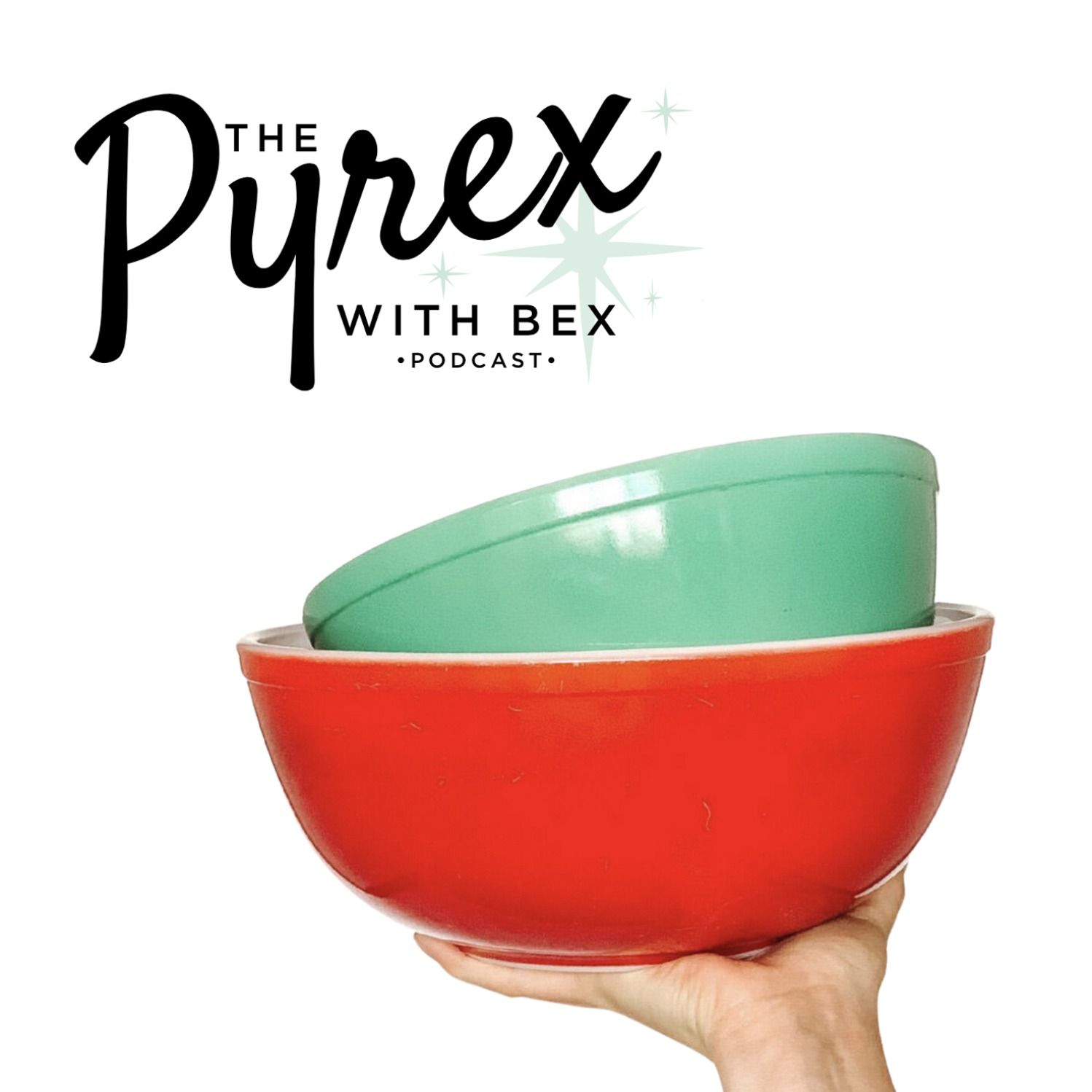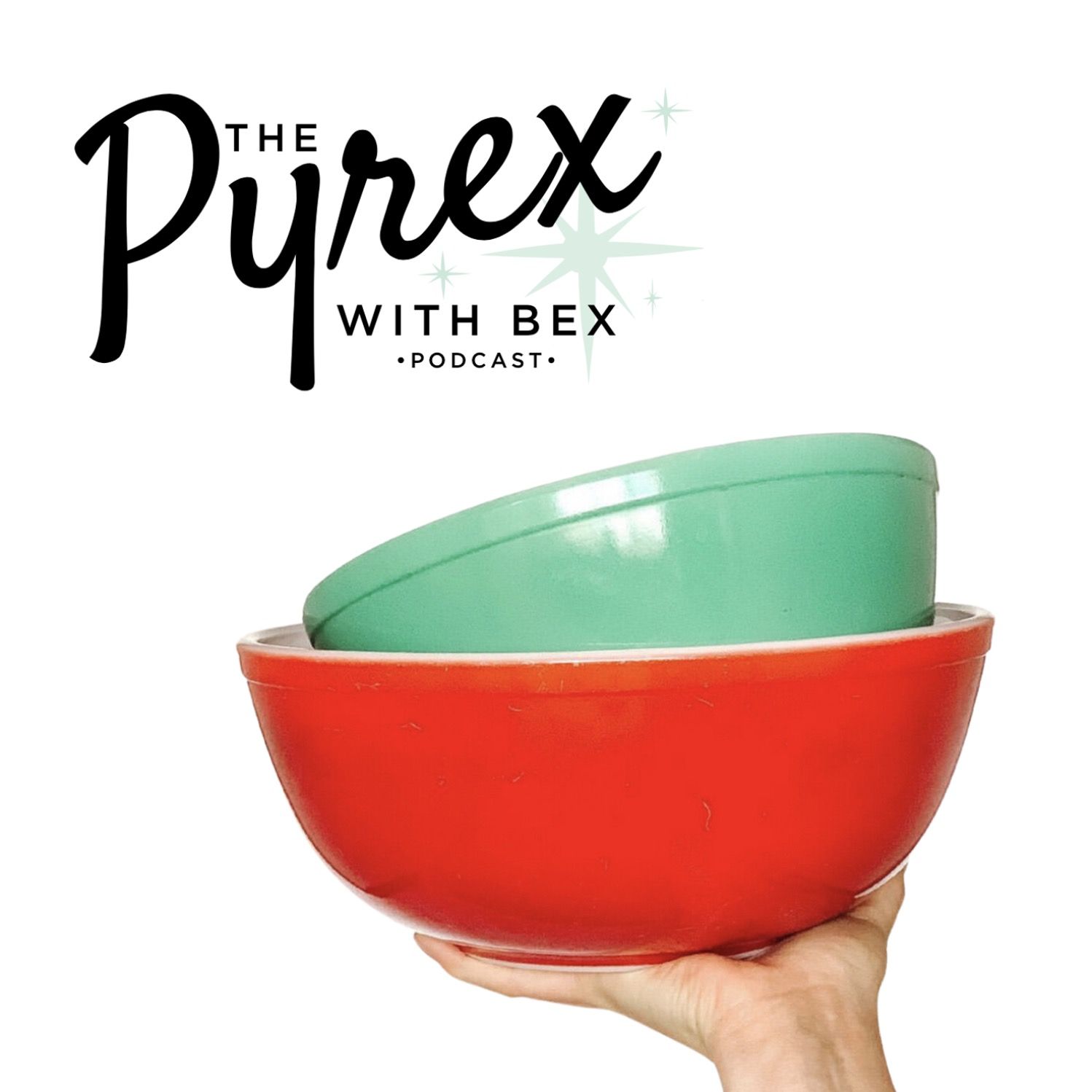The Homemaker's Encyclopedia - 1952
Description
In today’s episode, Bex Scott shares vintage advice and tips for the retro homemaker from “The Homemaker’s Encyclopedia - 1952” book that she recently acquired. Featuring of-the-time shopping advice, meal ideas, kitchen planning suggestions, and more, this is a genuine blast from the past glimpse into the housewife’s day-to-day mealtime expectations. Join Bex for a trip into the past and learn some new (old) ways to shop and cook to please your family.
“The Homemaker’s Encyclopedia -1952” includes such chapters as “Marketing Know-How”, “Different Items You Can Stock in Your Larder”, and “How Much Is Enough”. The author encourages women (the target audience for this book since it was women, the wives and mothers, who did all the grocery shopping, meal planning, and cooking in the 50s) to be unafraid of experimenting with “new foods, new recipes, and new ways of cooking”. She maintains that careful planning will enable women to provide balanced nutrition and budget-conscious meal preparation for their families. Bex also shares an amusing section on grocery store etiquette (including the gem “Dogs must be left outside, but children must often be brought inside”) and specific kitchen design shapes that maximize efficiency in prep and service. For lovers of vintage, retro cooking ideas, and amusing throwbacks, this episode is a must-listen.
Resources discussed in this episode:
—
Contact Rebecca Scott | Pyrex With Bex:
—
Transcript
Bex Scott: [00:00:02 ] Hey everybody, it's Bex Scott and welcome to the Pyrex with Bex podcast where, you guessed it, I talk about vintage Pyrex, but also all things vintage housewares. I'll take you on my latest thrifting adventures, talk about reselling, chat with other enthusiasts about their collections, and learn about a bunch of really awesome items from the past. Subscribe now on Apple, Spotify, or wherever you love listening to podcasts so you don't miss a beat.
Bex Scott: [00:00:31 ] Hey everybody, this is Bex Scott and you are listening to the Pyrex with Bex podcast. On today's episode, I thought it would be fun to go through a newly acquired book that I have called The Homemaker's Encyclopedia Food Buying and Meal Planning. Now this beauty is from 1952, so it is exactly what you might expect. The content is all about the woman being at home being the homemaker, the man going out and working his 9 to 5 job and coming home to his children and his wife being ready to serve him his meal and for him to relax with a drink in his hand. And I wanted to read some excerpts of this book to you because it was honestly very entertaining to read and to just note how different times are now than they were before. In my household right now my husband does all of the cooking. I like to do the cleaning. We both work and we both equally contribute to raising our three kids, and it was just really interesting to read through the difference in how they used to do things. And I know a bunch of you can probably remember this from your childhood, maybe your parents. That was the dynamic for them back in the 50s, and it would just be interesting to hear your take on things in your memories of how things were.
Bex Scott: [00:02:11 ] So I wanted to start off by going through the introduction, because I believe that this gives you, as it says, a good introduction to this interesting book. So it says "Every homemaker is conscious of the need to try to get the greatest value for the money she can spend. How to do this while still continuing to provide meals that are nutritious and varied, is the subject of conversation whenever good housewives get together. Books such as this can be of great help. In an interesting fashion with easy-to-follow suggestions, the author ranges over the fields of marketing and menu planning in an effort to help you in your daily program". Now, when they say marketing, this is kind of embarrassing because that's my field of work. I'm in marketing. And when I read that, I was really confused about what they were talking about. Marketing is actually going to the supermarket. So yeah, that was an interesting enlightning fact for me. "While keeping the main objective in view, that of securing the most nourishing foods at the prices you can pay, she nevertheless succeeds in proving to the reader that this branch of homemaking need never grow uninteresting or monotonous, just as the meals you serve need never become dull for your family. The willingness to experiment, to try new foods, new recipes, and new ways of cooking should be part of every housewife's equipment. In many an old-fashioned American household, the food followed an unvarying pattern: a roast on Sunday, hash on Monday, chowder on Friday, beans on Saturday, or whatever". Or whatever. "Before the family entered the dining room, they knew exactly what would be on the table".
Bex Scott: [00:03:58 ] Growing up, we had roast every Sunday and that was honestly the best day of the week for me. My mom's roasts, they were amazing. And when we go back home to visit with them, my mom still likes to make a roast for all of us when we get together. "Most younger women are more flexible than the old-time cooks. They are learning some of the secrets of using unusual flavor through spices, herbs, and sauces to borrow from other nations some tricks of applying imagination to the food they serve their families. American menus would be the poorer without Swiss and Italian cheeses, Hungarian goulash, French and Vienna breads, chili con carne, chow mein and chop suey, Irish stew, frankfurters and sauerkraut, England's plum pudding, or whatever your particular favorites happen to be. Bearing this in mind, you need never be afraid to experiment or pioneer in foods or methods. In this book, along with practical advice on efficient shopping techniques, cooking shortcuts, and dollar stretchers, you'll find a view of meal planning as a family affair. To many women, marketing and cooking is a burden because they do all of it alone. The author suggests ways in which the other members of the family can help. Father with the marketing, the children in preparing meals and helping to serve them. Making these projects a part of your family's life seems a practical application of homemaking. That art, which is, in the last analysis, the most important profession open to any woman".
Bex Scott: [00:05:28 ] So now we get into the good stuff. So we've been introduced to the book, know a little bit about it, so part one is meal planning. "Number one, a good meal doesn't just happen. The experienced traveller knows that the success of a trip depends on thorough, beforehand planning. Just so homemakers whose meals get consistent rave reviews from family and friends will tell you that a good meal is made at the meal planning desk rather than at the cook stove". And there's a nice picture of a woman sitting at her meal planning desk, and it says, "when you plan ahead, you can relax and enjoy meal times too". I can tell you that my husband doesn't have a meal planning desk, but I'm going to ask him now if he would like one, and I'll let you know what he says. Okay, so it says, "and while impromptu meals can be lots of fun once in a while, a steady succession of haphazard conglomerations tells its story in flurry and worry, not to mention the added expense which substitutes for proper planning. Your family will probably be most interested in how the food looks and tastes, and in whether you are calm and cheerful or cross and worn out when you join them at the table". I can tell you that our two sons could care less what the food looks like. They are more interested in how it tastes and how quickly they can consume it. "You, on the other hand, will be equally concerned with balancing the budget and the nutritional scale, for you know that the actual health of your family is dependent upon the meals you serve. Every smart woman knows that you can lead a husband to vitamins, but you can't always make him eat". That is something that I have never heard before. "This holds true of children as well and harping on food values usually creates eating problems rather than converts to balanced nutrition. When you plan ahead, you can relax and enjoy meal times too, secure in the knowledge that you are giving your family food they need in ways they enjoy it, with a maximum of economy and a minimum of work".
Bex Scott: [00:07:39 ] And then it goes into "four ways to help you turn meal planning from a hand-to-mouth operation into a pleasant and worthwhile habit". Next up, this is a little pull quote that I had to share with you guys. It says "Entree, usually a made-up dish of an unusual food". So if anybody ever asks you what an entrée is, please be sure to use this definition. Okay next up we have the elements of a successful meal. "When you get right down to the business of meal planning, you must remember to coordinate a number of other factors with your four menu factors of: number one nutrition values, number two economy or money-saving, number three efficiency or time and effort saving, and number four" is my favorite "honest to goodness pleasure in eating". That's why I eat. Not to survive. I eat to enjoy and experience the pleasure in eating. "So you may want to introduce new foods, provide an invalid diet or entertain company on a budget. You may decide to streamline the family's collective waistline through a high-protein but low in calorie diet. Or y
























